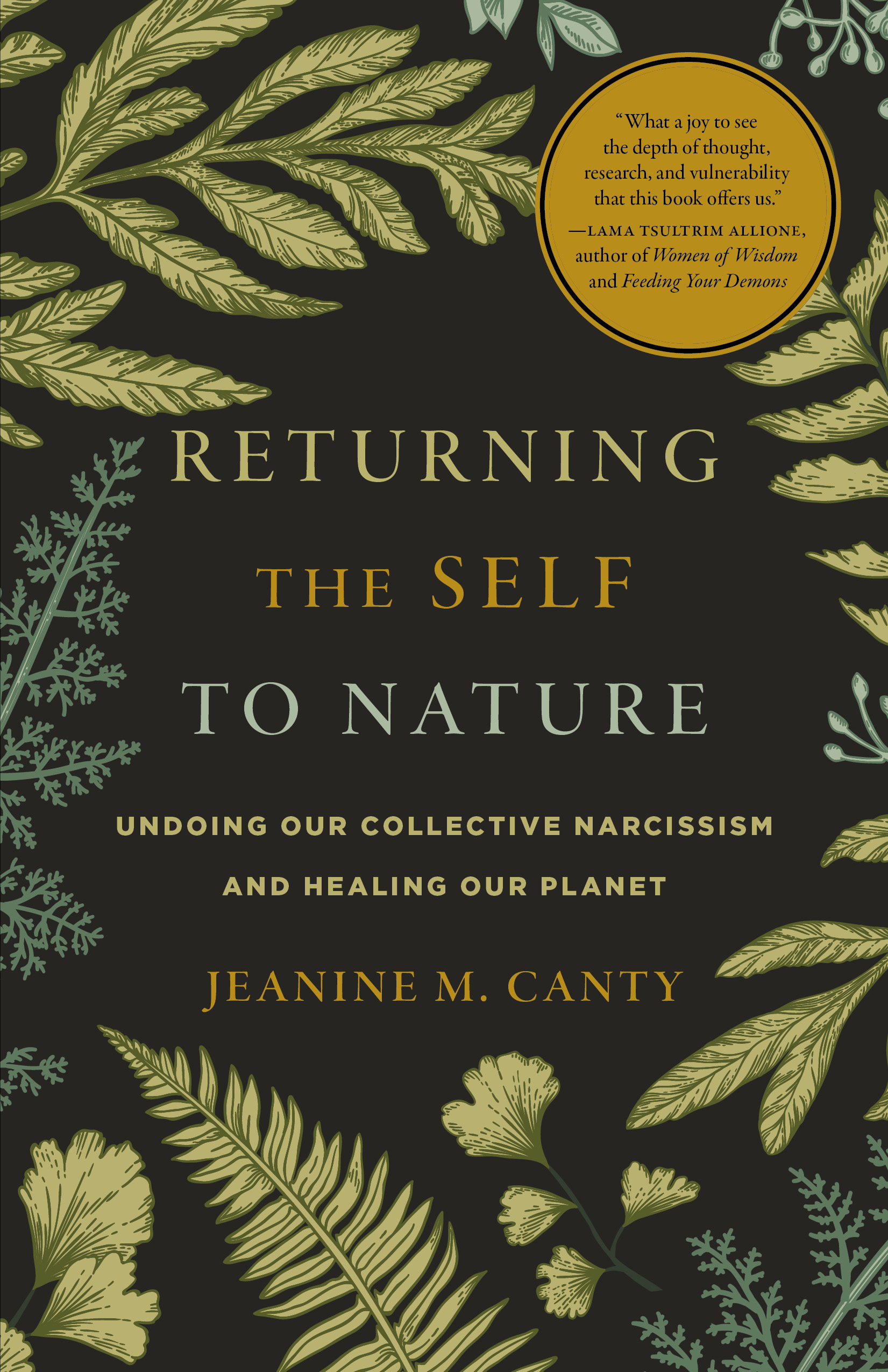
Adapted from Returning the Self to Nature: Undoing Our Collective Narcissism and Healing Our Planet by Jeanine M. Canty © 2022 by Jeanine M. Canty. Reprinted in arrangement with Shambhala Publications, Inc. Boulder, CO.
From Individual To Collective Narcissism: A Cultural Shift
The world of the narcissist is not a kind space. Very few people enjoy being around someone who is self-centered, arrogant, volatile, and insincere—probably not even the narcissist. Experts recommend that a person who is in a troubling relationship with an extreme narcissist cease contact, if possible, because people with NPD rarely change. Counselors typically encourage those who have been abused by narcissists to try to sever ties, process the experience as best they can, and move on—though this can be quite difficult, especially if the narcissist is a family member or spouse. However, even if the person is successful in never having to deal with the narcissist again, the narcissist will find another person or even multiple people to receive attention from—and then the whole cycle begins again.
But what if it isn’t an isolated narcissist we are trying to avoid? What if our entire society is becoming narcissistic? Now our understanding of the problem has to develop away from something damaging yet discrete, like a car accident, and toward something slower, steadier, and even more insidious—the enculturation of toxicity, like the breathing of polluted air. In my view, this is exactly what is happening in our world today, and it’s been building for a long time. Western societies—and, arguably, any society that is heavily influenced by a Western-dominated, materialistic worldview—are swimming in narcissism.
Think of the classical illustration of Narcissus, staring at himself in a pond. Today we are surrounded by people who are self-consumed with their own image, and we are regularly prompted to enter that state ourselves. Think about social media platforms where folks ceaselessly post about themselves—the relentless selfies; the constant need to look good to the outward world, even when things are not great. More and more, our culture encourages us to focus solely on ourselves—it is becoming pathological. We have a need to be someone special and, to a certain extent, this is not surprising. In the United States, we live in a country that is hyper individualized. Essentially, the rights of the privatized individual are held as the golden mean and come with the expectation of competition to be at the top. Think of common sayings such as “Look out for number one” or “It is every man for himself.” The “American dream” tells us that we must struggle in the fight to get to the top, and if we work hard enough, we will get there. Yet where there is a top, there is a bottom. The Darwinian concept of “survival of the fittest” is taken to a new level, where we often feel that the world is a hostile place, and unless we compete against others and win, we will fall to the bottom and essentially lose.
It comes as no surprise, then, that for many, we live in a mean world. The term for this, mean world syndrome, was coined by the communications researcher George Gerbner, who studied the influence of violence in the media on the general population. In short, his research revealed that while the increase of violence exhibited on television and in other forms of media did not increase the amount of violence in the world, it did increase people’s perception of the world as a violent, mean place. 9 The more people consume media violence, the more violent the world appears. This finding causes me to wonder about the effects of the ever-proliferating media content by and about narcissistic people. Does mean world syndrome have a parallel that we might call narcissistic world syndrome? The influences supporting a me-centered worldview go beyond our social media posts; they include the ads that bombard us with messages about the goods and services we need to be our best selves, as well as the images we constantly see that describe the successful person—fit, good-looking, wealthy, independent, self-made. This is not a self that strives to help others but one concerned with self-interest. We are so surrounded by selfishness that it often appears as the new normal.
So many of our current stories reinforce this mean and me-centered world. Reality television shows highlight characters who are ruthless and self-centered. There are endless depictions of evil villains, vampires, zombies, serial killers, and other psychopaths in movies, television, podcasts, comics, and books. People seem to eat up these themes that reinforce a view of a world divided by good and evil, self and other. And then the actual news perpetually illustrates all the perils that pervade our society—murders, corruption, violence, terrorism, poverty, ecological disasters, racism, misogyny. Many of the perpetrators of our time—whether real or fictitious; whether a monster, a reality television star, a politician, or a corporation—appear as self-centered, manipulative, and highly dangerous, demonstrating that the world is not a safe place. It is no wonder that the world appears hostile.
~
If we briefly revisit the common developmental structure of individual narcissism in the context of our emerging collective narcissism, a clearer picture starts to form. In the case of the individual narcissist, we typically find that a primary caregiver did not foster a strong sense of self and security in the child. Over time, the child adapted to this situation by forming a false self whose reality, while badly out of touch, ensured a kind of pseudo-independence and stabilized a certain delusion of safety, and the child carried forward these habits into adulthood. For collective narcissism, in place of parents or caregivers, we have a consumer culture based on perpetual desire that fosters insecure false selves on a mass scale. As with parenting, this begins in childhood; unlike parenting, it does not come to a close: we absorb this culture throughout our lives. Advertisements and other forms of media monopolize our understanding of self, focusing us outward on superficial yet unattainable ideals. Such ideals promote homogeneity of vision while telling us that we are supposed to be uniquely special and if we try hard enough, we can be. As is evident in the life stories of many millionaires and billionaires, the consumer hamster wheel has no stopping point; there is always another level of wealth, power, influence, or conspicuous consumption to achieve—a bigger yacht, a more powerful lobbying group, a first private trip to space. What kind of basis for sane selfhood is that?
In this cultural context, the modern individual is encouraged to author their own tale of specialness, essentially creating their own reality in which they must look the best, get the highest grades, buy the most expensive things, and have the most impressive job. The “most,” “best,” and “highest” are necessarily in comparison to others, causing unneeded competition against our friends, neighbors, coworkers, classmates, and family members. Our need to be better than causes us to be overly prideful, arrogant, and boastful about our accomplishments, with little awareness of how this affects others and ourselves. When we do not meet these ideal standards, we become vulnerable, defensive, depressed, and dissatisfied, damaging our already fragile egos. We perpetuate cycles of creating the persona of who we want to be, aggressively projecting this image to the world, and crashing when our expectations are not realized.
Some Jungian psychologists see our collective narcissism as an archetype that is overtaking our culture. Archetypes are the stories, myths, art, and symbols we use to represent ourselves. They are not always blatantly manifest, often remaining hidden in our collective unconscious. We are always living within a cultural story that is embodied within an archetype. The “American dream” is an archetype where the hardworking individual can climb the ladder of success. The current obsession with superheroes is another archetype where good always prevails over evil and someone with special powers will save the day. While often helpful, archetypes are not necessarily true. They are stories we would like to believe, similar to myths or origin stories. Alluding to narcissism, the physician and Jungian psychologist Dr. Steven Buser notes that a collective archetype may form in response to “complexes that provoke unusual mass behavior.”16 Could it be possible that the growth of narcissism in individuals is laying the ground for our collective story, whether consciously or unconsciously?
A society based on narcissism leaves individuals little time to focus outward on other people and little to no time to focus on outward issues. If I am consumed with the preparation, execution, and maintenance of my image, how can I help a loved one? If I barely have time for my loved ones, how can I serve my community? If I do not have time for my community, how can I serve Earth?
Notes
- The Mean World Syndrome: Media Violence & the Cultivation of Fear, written and directed by Jeremy Earp (Northampton, MA: Media Education Foundation, 2010), film transcript, https://www.mediaed.org/transcripts/Mean-World-Syndrome-Transcript.pdf.
- Christopher Lasch, The Culture of Narcissism: American Life in an Age of Diminishing Expectations (New York: W. W. Norton, 1979), 13.
- Audre Lorde, A Burst of Light: Essays (Ithaca, NY: Firebrand Books, 1988), 130.
- Allen D. Kanner and Mary E. Gomes, “The All Consuming Self,” in Ecopsychology: Restoring the Earth, Healing the Mind, ed. Theodore Roszak, Mary E. Gomes, and Allen D. Kanner (San Francisco: Sierra Books, 1995), 77–91.
- This argument is developed at length in Jean M. Twenge and W. Keith Campbell, The Narcissism Epidemic: Living in the Age of Entitlement (New York: Harper Perennial, 2009).
- Durvasula, “Don’t You Know Who I Am?” 36.
- Durvasula, “Don’t You Know Who I Am?” 63.
- Steve Buser “The Trump Complex, the John Wayne Archetype and States of National Possession,” in Clear and Present Danger: Narcissism in the Era of Donald Trump, ed. Leonard Cruz and Steve Buser (Asheville, NC: Chiron Publications, 2016), 14.
~
Please consider Boosting our authors’ articles in their first week to help them win Elephant’s Ecosystem so they can get paid and write more.


 Share on bsky
Share on bsky




Read 2 comments and reply